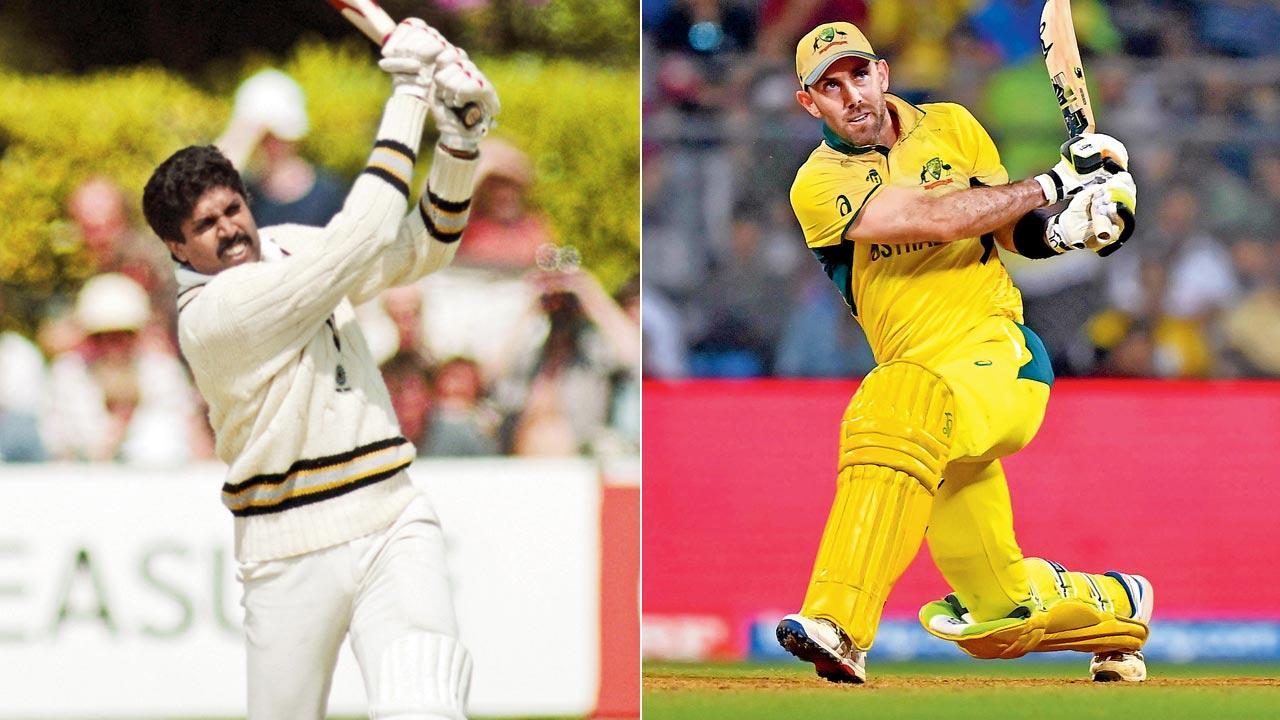Comparisons are being made between Kapil Dev’s 175 and Glenn Maxwell’s 201 at this World Cup. The playing conditions and rules are different, equipment was sometimes primitive then. So, it’s a total waste of time and…

Kapil Dev during his 175 not out against Zimbabwe in the 1983 World Cup at Tunbridge Wells; {right} Australia’s Glenn Maxwell during his 201 not out v Afghanistan at Wankhede on Tuesday. Pics/Getty Images
 By a strange coincidence the 1983 World Cup-winning squad was at an event in New Delhi when Glenn Maxwell was playing what is undoubtedly the innings of this century. We were getting updates as to what was unfolding there at the Wankhede Stadium even as Kapil Dev’s knock was being recalled with the same jaw-dropping awe 40 years later by his teammates.
By a strange coincidence the 1983 World Cup-winning squad was at an event in New Delhi when Glenn Maxwell was playing what is undoubtedly the innings of this century. We were getting updates as to what was unfolding there at the Wankhede Stadium even as Kapil Dev’s knock was being recalled with the same jaw-dropping awe 40 years later by his teammates.
Immediately, comparisons were being made between the knocks with some suggesting this knock was better than that. This is so typically Indian, this habit and insane desire to compare. Nowhere else in the world, including our neighbouring country, are players and performances compared across different eras, but we in India just love to do this. It’s wanting to show that the current is better than the past, not realising that in trying to do so, we are bringing our own heroes down.
Records meant to be broken
Records are meant to be broken as it is a sign of human progress, but if it’s a record that belongs to an Indian and when another Indian is nearing it, the frenzy to see it broken or overtaken is nothing short of manic.
Have you ever heard any of the other countries indulge in comparisons between the past and the present. Yes, there is always the hope that today’s budding talent is going to be like the earlier era’s match-winner. Like in India, there is always the quest for another Kapil Dev because who else in the history of Indian cricket has impacted and changed the fortunes of a match with both bat and ball as regularly as Kapil did? Yes, there have been wonderful bowlers who have won games for us as well as batters who have played splendidly to take India over the line but nobody did it with both bat and ball as effortlessly and regularly as Kapil did.
The playing conditions were different, the rules were different, the equipment earlier was sometimes primitive, there was no technology to help the players nor was there the kind of support staff to help address any issue the player may have.
Yes, the scrutiny is incredible today and that adds to the pressure and with the passion to be liked in the public media, the players are in a Catch 22 situation. So, comparisons are useless and a total waste of time.
Also read: Maximum city, minimum effort?
Today, franchise loyalty also brings about clashes between supporters and fans of different players with the fans often forgetting that they are now playing for the country and not for the franchise.
Sadly, no recording of 175
Kapil’s knock was sadly not recorded as the BBC, who had the broadcast rights at the time, was on strike and there was nobody even using their personal camera as just about everybody today has, to record the innings.
While today, the performances are filmed and recorded for posterity, the circumstances in which those were performed can never be adequately conveyed. Still, for all those who were at the Wankhede Stadium that day, they will be able to say proudly that they were there when Maxwell, in unbelievable physical discomfort, played what is the current century’s greatest one-day knock.
That knock also snatched victory from the jaws of defeat for the Australians and emphasised once again why they have been five-time champions in the 50 overs World Cup.
It also demoralised the till then extremely spirited Afghanistan team that they were unable to bring their A game to the last match against South Africa and went down rather tamely, ending any chance they had of getting to the semi-finals. Still, they can go back with their heads held high for they beat more than one former champions in the tournament and told the cricketing world that here is a team nobody can ever take lightly again.
The stage is now set for the semi-finals and it gives India an opportunity to get over the stumbling block, New Zealand, of the previous tournament in 2019 and get over that heart break. Knockouts are never easy for the teams know if they have a bad day then it’s ‘goodbye and see you in four years time’. The last three tournaments have been won by the host nations. Will the trend continue? More than a billion Indians are praying that it should.
Professional Management Group
 Subscribe today by clicking the link and stay updated with the latest news!" Click here!
Subscribe today by clicking the link and stay updated with the latest news!" Click here!








